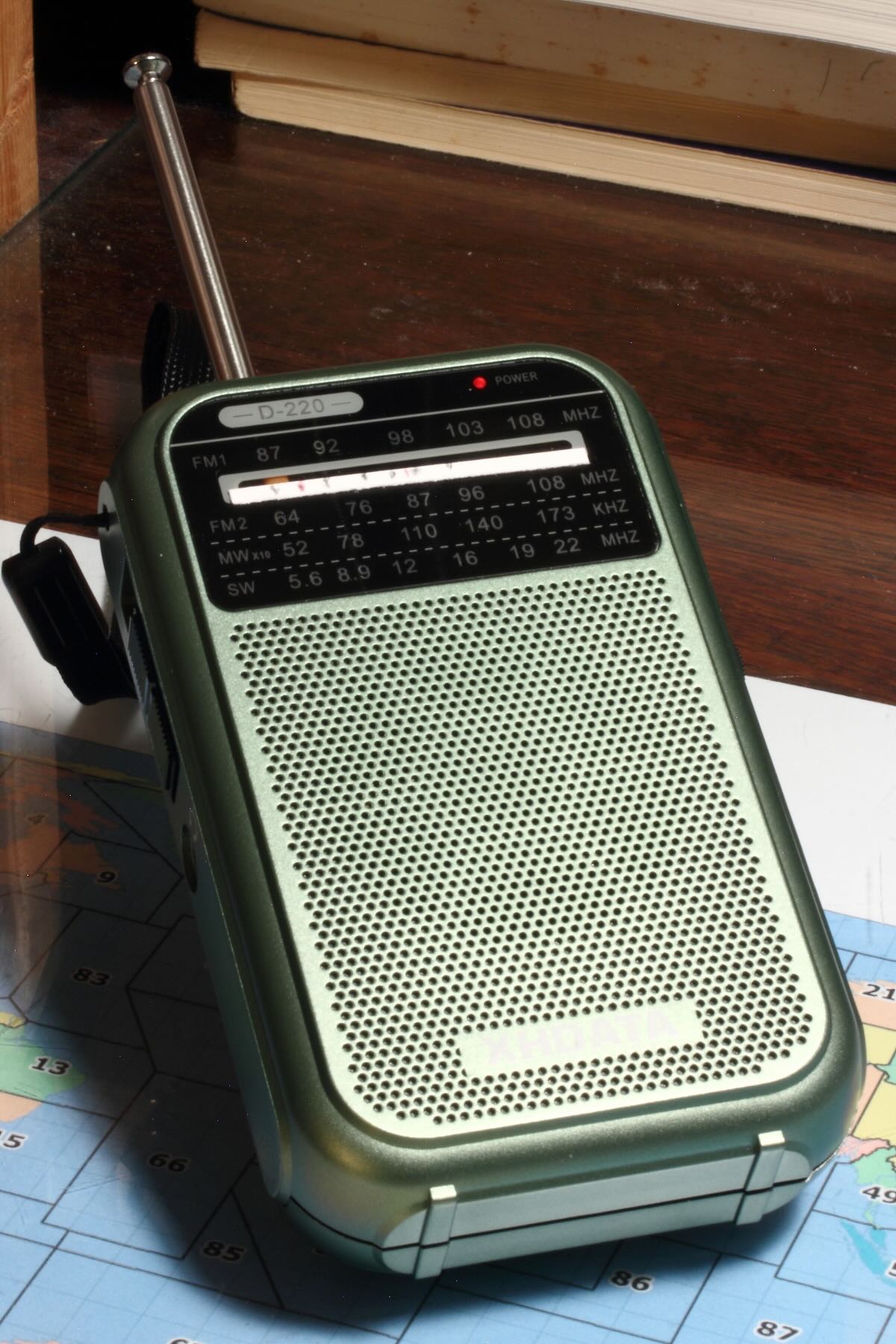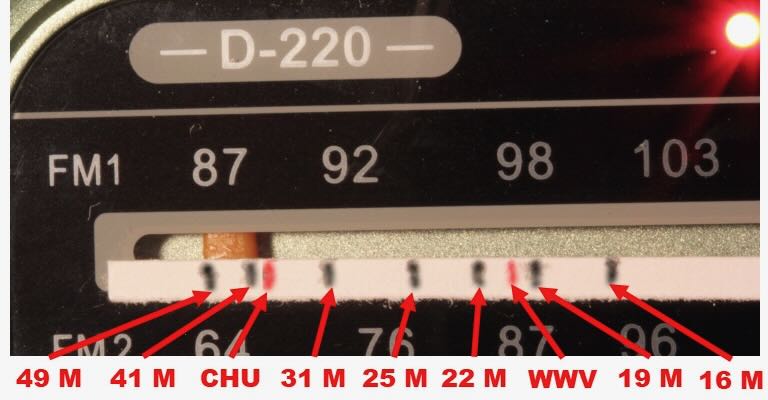Many thanks to SWLing Post contributor, Bob Colegrove, who shares the following guest post:
 A Band Aid for the XHDATA D-220
A Band Aid for the XHDATA D-220
By Bob Colegrove
In the olden days of analog radios, we would have generated a graph plotting frequency against a 0 to 100 linear bandspread scale. That permitted determination of a station’s frequency with varying degrees of accuracy.
The case of the charming little D-220 requires a simpler approach. The dial covers 5.6 MHz to 22 MHz in less than two inches. They could have cut off coverage at 18 MHz and gained a precious half inch of dial.
With the shortwave scale well below the pointer, I needed some additional guidance indicating where I was. Best not to get too fancy. I cut a strip off a sticky-back label and attached it to the dial right below the pointer. Using the left edge of the pointer as a guide, I marked off the location of each international broadcast band and a couple time stations. The width of each band isn’t much more than the point of a sharp No. 2 pencil. Any further resolution is hopeless, but at least you know what part of the spectrum you are in.
Again, going by the old logarithmic analog dials you would expect the frequencies to be increasingly mashed together as you go higher. This is not the case with the D-220, nor do the increments appear to be very linear. At any rate, it is now relatively easy to tune from band to band.
The sensitivity and clarity of the D-220 is amazing. Perhaps it’s the green one.


Mine arrived wednesday in The Netherlands. With shippingcosts € 20,00 euros. Yes, the shortwavebands are tight and the idea of marking stations is great!
Thanks for the tip!
Sensitivity is great. My only issue was if I tuned to far right
of the dial, when trying to go the other way, it got “stuck”. Returned for replacement, which will arrive tomorrow. If this one sticks, I’ll probably take cover off to see what is binding.
Just got a message from my neighbour that my D-220 arrived today.
Unfortunately I am in Trondheim, and will be here till sunday. So I’ll come back home way too late for your contest, but if it becoimes a success, I’ll participate next time.
BTW, I ordered a green one 🙂
Egil – LA2PJ
My wife still paints the mute button on the TV remote control with red nail polish too! I listen to my radio. Glad it’s muted.
Good idea. I wonder too why they don’t Stat at 4.5 Mhz since there is more stations in this area than on the higher bands. I have the ? green one and yes the sensitivity is good on this radio.
I just clipped a quarter inch sticky end of a Post-It and let it cover the FM2 band. That way I can mark the top edge of the Post-It for SW signals and the bottom edge for AM stations. It isn’t rocket science perfect, but it gets me a little closer to figuring where I am on the dial.
Sounds like a great little set, but where do i find it??
Greg —
Available from Amazon and also directly from XHDATA.
I just tried this and it works great. At the top of the strip I made a 0 – 8 logging scale and at the bottom of the strip I marked WWV 10 and 15 MHz, will mark more later.
I just looked at some D-220 reviews and some seem to be along the lines of “I put in some old, nearly dead batteries, tuned through shortwave, and didn’t hear anything.” Really? 🙂
I stepped outside just a bit ago (around 1445Z) and heard (frequencies and IDs confirmed by walking back inside and finding the station on my R-1000):
Sound of Hope from Taiwan, 21490, Mandarin
CRI from Kashi-Saibagh, 17735, Chinese (dialect not specified)
VoA Radio Ashna from Kuwait, 15575, Pashto (directed to Afghanistan)
Seems to work OK for me… 🙂
This is a great idea, and it looks good too!
And I forgot to add … yes it is the green. The green is clearly the best! The orange/yellow is pretty spiffy looking, though. Might be second best. 🙂
Excellent! A couple of variations come to mind, such as using the label to mark the location of favorite stations such as RNZ, RRI, REE, Ifrikya FM, etc. (Of course, you’d have to remember which mark went with which station.) Or, on the D-219, using this to add a much-needed logging scale to the bottom of the tuning indicator.
Is the green more sensitive than the orange? Looks like I need to buy another…hihi. BTW, with a few points and discount on Amazon I paid $4.50 so not a bad deal!
Awesome. I just did a quick video of this on my YouTube channel.
Thanks Tom. After writing this, I was reminded of my late mother who used to dab red finger nail polish on the dial where all the local stations came in.